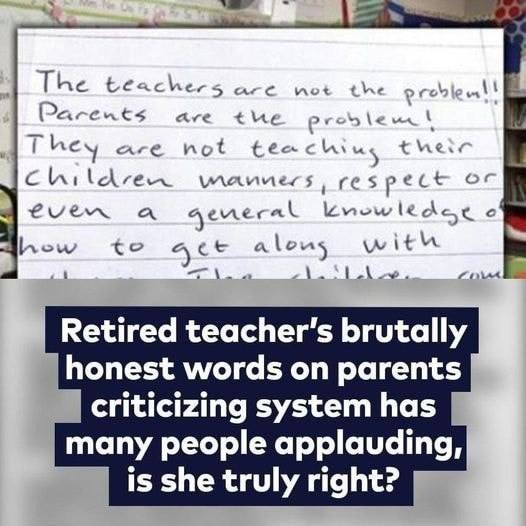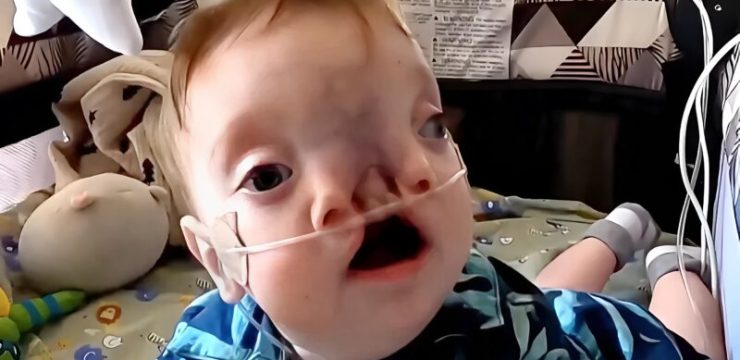In 2017, Lisa Roberson, a retired teacher with decades of classroom experience, penned an open letter that quickly went viral and sparked an important conversation about the state of the American education system. Published in the Augusta Chronicle, her letter struck a nerve with parents, teachers, and administrators alike. Rather than focusing blame on teachers or the school system itself, as many debates about education tend to do, Roberson made the bold decision to hold parents accountable for many of the issues facing today’s classrooms. Her honest and direct message was clear—if we want to improve our schools, parents need to step up and take more responsibility for their children’s behavior, values, and academic success.

In her letter, Roberson argued that the core of the education problem wasn’t ineffective teachers or underfunded schools, but rather a widespread lack of parental involvement and accountability. She had seen it time and time again during her years as an educator—students who came to school unprepared not because they couldn’t afford school supplies, but because parents had different priorities. She pointed out the irony of children arriving at school wearing brand-name sneakers and carrying expensive smartphones, yet not bringing even the most basic classroom necessities like pencils, notebooks, or paper. In many cases, teachers were left to cover these shortages themselves, often using their own money to buy supplies for students who came to school without them.
Roberson also touched on another critical issue: the lack of respect and manners displayed by some students, something she believed should be taught at home long before a child enters the school system. She explained that teachers are not just responsible for delivering academic content, but are often tasked with teaching basic social skills and discipline—things that were traditionally instilled by parents. Roberson felt that the role of a teacher had expanded far beyond its original scope because too many parents were failing to teach their children how to behave respectfully, follow instructions, and take personal responsibility for their actions.
In her letter, she posed a simple but powerful question: how many parents take the time to check their children’s homework every night? How many attend parent-teacher conferences, show up for school events, or maintain regular communication with their child’s teachers? From her experience, the answer was “not enough.” Roberson believed that many parents had become disengaged from their children’s education, expecting teachers to handle every aspect of their academic development without offering support or involvement from home. She argued that if more parents took an active role in their child’s learning, many of the struggles that schools face today would be significantly reduced.
@marcistook This amazing letter from teacher Lori Singaraju to parents is going viral, and you can see why. The level of care, empathy and understanding the reminder I needed today. 🥹 Also, a huge credit to all our educators like Lori who spend so much time loving on our kids every single day! #fyp #foryou #teachers #parenting #educators #thankyouteachers ♬ Married Life (Piano Version) – The Chillest
Her message wasn’t one of blame for the sake of blame, but a plea for partnership. Roberson emphasized that education works best when it is a cooperative effort between teachers and parents. Teachers can provide knowledge, structure, and guidance in the classroom, but they need parents to reinforce those lessons at home. When parents teach their children respect, manners, and the importance of education, they set the stage for their children to succeed academically and socially.
The impact of Lisa Roberson’s letter was immediate. Her words resonated with educators who often feel they bear the brunt of criticism about failing schools, despite working tirelessly under increasingly difficult circumstances. Many teachers praised Roberson for giving voice to their frustrations and shedding light on the often unseen challenges they face. However, some parents pushed back, arguing that not every family has the time or resources to be as involved as they would like. Still, Roberson’s letter sparked an ongoing debate about where responsibility lies when it comes to educating the next generation.
Years later, Roberson’s message continues to circulate on social media and in discussions about education reform. Her call for greater parental responsibility remains as relevant as ever, reminding us all that improving schools isn’t just about policy changes or increased funding—it’s about families and educators working together to support children’s growth and development. For Roberson, and many like her, the path to better education starts at home. When parents engage, teach, and support their children, they create a foundation for learning that no teacher or school system can provide alone. Her letter, though simple, continues to inspire reflection on how we can all do better for the sake of our children’s future.





